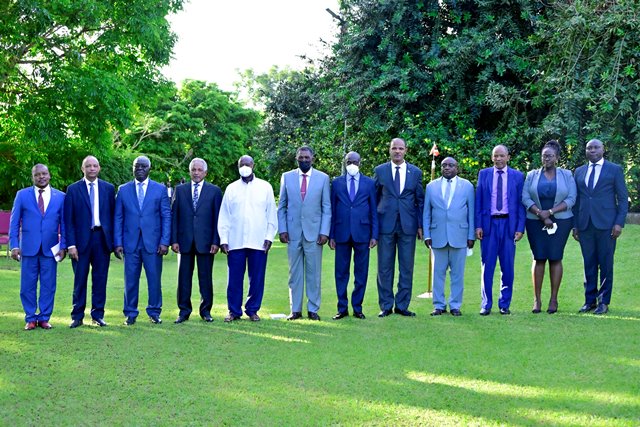Museveni in meeting with Khartoum special envoy plots for Sudan stability
Museveni said politics of identity is the biggest challenge causing instability in Sudan and the existence of Hemeti’s group which he said was a mistake.

President Yoweri Kaguta Museveni has said the biggest problem of Sudan and Africa at large is emphasizing politics of identity and this is partly to blame for the pockets of instability in many parts of the continent.
The President made the revelation on Wednesday as he met Ambassador Dafallah Al-Haj Ali, the Special Envoy of the Chairman of the Transitional Sovereignty Council in Sudan who called on him at State House- Entebbe to brief him about the ongoing efforts to silence the gun for a smooth peace process in Sudan.
Museveni said when they came to power in 1986; they emphasized politics of interests and not identity, a reason the NRM government has been able to stabilize Uganda after winning the civil war and eventually elections where NRM has always won massively on the first round.
According to the President, politics of identity is the biggest challenge causing instability in Sudan and the existence of Hemeti’s group which he said was a mistake, citing it as an example of this problem.
He noted that since people seem to have learnt, peace should return to Sudan.
“Now it’s time to really stabilize Sudan. This war is of course another mistake,” Gen. Museveni stressed.
He also called for a ceasefire disengagement and to allow peace for people to elect their leaders as owners of the country.
“My recommendation is, the people of Sudan are there- the country does not belong to the Sudan Army, it belongs to the people. The political issues are resolved by the people themselves,” Museveni said.
Gen Museveni was however happy to learn that the two worrying parties; the one led by General Abdel Fattah al-Burhan, Sudan’s Army chief and head of the ruling Sovereign Council and the one led by Sudan’s paramilitary Rapid Support Forces commander, General Mohamed Hamdan Dagalo famously known as Hemeti had initially agreed to integrate the Rapid Support Forces into the national army.
“Integration is very simple if you have got the political will. It is determined by the speed at which you can train the irregular into regular,” H.E Museveni further noted, adding that when they defeated Idi Amin in 1979, it took them 3 years to create a new national Army.
The Sudan special envoy informed President Museveni that the two parties have agreed to move the fighting from the population, the civilian quarters and hospitals and now there’s a big progress from the military to end the fighting.
Ambassador Dafallah Al-Haj Ali also extended appreciation from General Abel Fattah al-Burhan and the people of Sudan to President Museveni for the efforts to ensure peace and development in their country.
“You have a special place in the minds and hearts of the Sudanese. Wherever we go both in the villages, towns and the capital, people share this feeling,” Ambassador Dafallah noted.
The armed conflict between rival factions of the military government of Sudan began on 15 April 2023 with clashes in western Sudan, in the capital city of Khartoum, and in the Darfur region. At least 700 people had been killed and more than 5,100 others injured.







